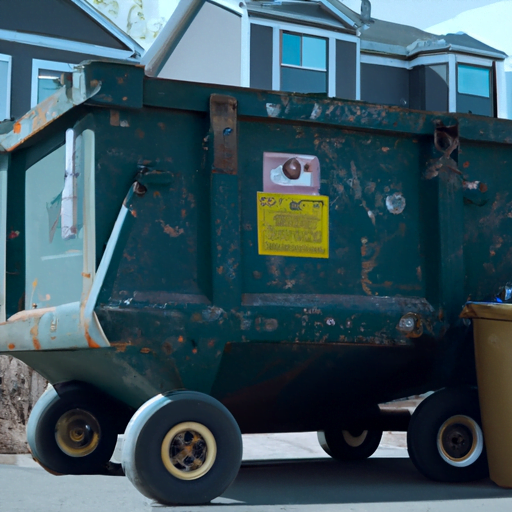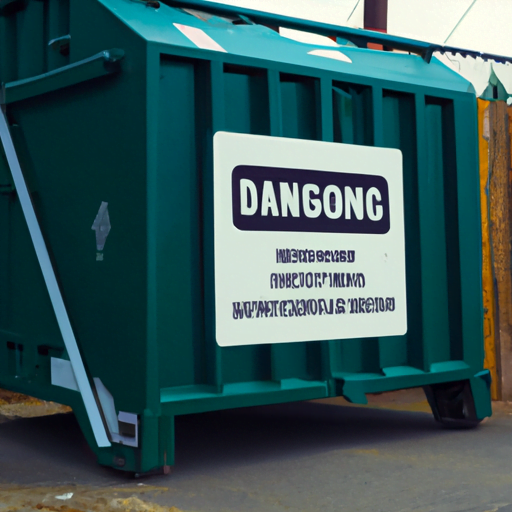-
Table of Contents
Introduction
“Demystifying Local Regulations: What You Need to Know Before Renting a Dumpster in Your Area” offers comprehensive guidance on the often complex regulations surrounding dumpster rentals. The guide provides essential insights into navigating through local ordinances, permits, and zoning laws associated with waste disposal and management. It aims at empowering individuals and businesses planning for home renovation projects, clean-outs or construction work by providing a clear understanding of the legalities involved in renting a dumpster locally to promote responsible waste disposal practices.
Understanding Local Regulations: Essential Details for Renting a Dumpster in Your Area
When considering a home renovation project or cleaning out that old garage, one of the less glamorous aspects to consider is waste disposal. One convenient solution many homeowners lean on is renting a dumpster. However, before you decide to do this, it’s essential to understand local regulations surrounding dumpster rentals as they can vary significantly from one location to another.
At first glance, renting a dumpster seems pretty straightforward. You call up your preferred company; they drop off an empty container at your property and pick it up when you’re done filling it with debris. But beneath that simplicity lies a maze of rules and regulations that need careful consideration.
Let’s start with permits. The necessity for these will largely depend on where exactly you plan to place the rented dumpster. If it’s strictly within your private property – like in your driveway -then there might not be any permit requirements. However, if part of the container will rest on public space or obstruct traffic in any way – such as sidewalks or streets– then you may have to apply for a permit from city hall or other local authorities.
The cost and processing time for such permits will also vary depending upon local laws and policies so avoid last-minute snags by getting started early ahead of time especially given how quickly slots fill up during peak construction periods.
Now let’s move onto restrictions about what can go into dumpsters — illegal dumping isn’t just wrong because we say so but actual penalties exist for those who violate waste disposal guidelines set forth by most municipalities & cities across America! For example: hazardous substances like paint stripper chemicals are generally forbidden while heavy materials (concrete slabs) could exceed weight limits imposed upon rental companies leading potentially hefty fines levied against violators!
Then comes perhaps most complex aspect figuring out right size needs certainly don’t want end paying monstrous roll-off capable holding twenty cubic yards demolition debris only end tossing couple cabinets maybe bit drywall Conversely neither want get stuck tiny bin incapable handling renovation refuse Take factors account overall volume material type junk involved? Heavier items require sturdier containers larger sizes
Lastly costs associated various types services Don’t assume flat rate covers everything Always check terms hidden fees Know budget beforehand factor potential additional expenses Remember get written quote lock price so surprise hits down line Additionally look discounts promotions offered providers sweeten deal save few bucks process
In conclusion understanding local regulations crucial step planning successful stress-free cleanup project By knowing what expect navigate system seamlessly eliminate possibility unexpected hurdles road Be sure consult reputable trustworthy company help guide specifics area They possess necessary expertise make process smooth sailing keenly aware practicalities complexities involved Enjoy cleaner clutter-free happier home without pitfalls penalties
Demystifying Local Regulations: Steps to Comply Before Renting a Dumpster
When embarking on a major home renovation project or overseeing a large-scale clean-up operation, renting a dumpster can be an incredibly helpful service to streamline the process. However, navigating local regulations related to dumpster rental isn’t always straightforward; it may seem daunting and confusing. So let’s demystify these rules and ensure you’re informed about what needs consideration before booking that dumpster.
Initially, understanding your municipality’s specific requirements is crucial. Local governments often have strict rules regarding appropriate placement of dumpsters to avoid hazards for pedestrians and drivers alike. Some require permits if the container is going to be placed in certain locations such as public streets or rights-of-way while others might need notification but not necessarily a permit.
This brings us neatly onto identifying where exactly you’ll place your rented dumpster when it arrives – planning is key here folks! It should be easily accessible without obstructing traffic flow whether vehicular or pedestrian oriented. Also consider its impact on your neighbors: Is it blocking their view? Could they potentially suffer any inconvenience due to the location? These are necessary questions because we certainly don’t want disgruntled neighbors coming knocking at our doors complaining about unsightly dumpsters!
Now let’s think about size – nope not shoe size but something just as important – Dumpster Size! Renting larger ones prevents overfill issues; however, bear in mind local regulations may prescribe limits on allowable sizes especially if placing them in public areas also remember that weight impacts fees with heavier loads leading higher charges.
Talking about fee structures smoothly leads us into another critical checkpoint – potential additional costs outside initial rental prices like extra landfill fees for certain types of materials being disposed of (e.g., electronics); penalties for overloading; extension charges etc make sure you ask these relevant queries upfront from providers so there’s no surprise landing along with junk later!
Another question I bet we forget often- Can my driveway handle this? Before hiring heavy equipment check if driveways/pavements can take machinery weight without cracking additionally will available space allow maneuverability?
And then there’s waste restrictions – whilst many items are usually good-to-go including construction debris household trash furniture some items aren’t generally allowed e.g hazardous materials chemicals flammable liquids tires batteries realize each city county or HOA has own set norms other common offenders dumped are appliances containing Freon paint pesticides which might require special recycling procedures ensure compliance by educating yourself more importantly reducing environmental harm
An oft-overlooked aspect relates aesthetics municipalities could mandate screening requirements ie making visible eyesores less well…eyesore-ish using fencing shrubbery tip: get creative!
Lastly consider duration limits regions only allowing units remain specific periods extended stays resulting fines quick fun fact did know Seattle restricts residential zones 72 hours yep heard right three days!
So concluding remember renting dumpster shouldn’t make anyone feel daunted all needed thorough research respecting community laws ensuring smooth stress-free experience after all tool ease challenge clearing unwanted stuff efficiently properly right down federal state county equally council level yes seems tedious worthwhile way long run helping maintain order safety sanity beautiful neighborhoods live work play now equipped knowledge let’s roll choosing perfect bin next big project friendly reminder brush upon facts first till then happy organizing!
Renting a Dumpster: Navigating Through the Maze of Local Regulations in Your Area
If you’re planning a major clean-out or construction project, renting a dumpster can be instrumental in managing the waste efficiently. However, before placing that order for your gigantic garbage container, it’s essential to understand the local regulations surrounding dumpster rentals. Navigating through this maze of rules and guidelines might seem daunting at first glance, but once demystified, it becomes easier to comprehend.
First and foremost, let’s tackle permits. In many regions across the United States, whether urban neighborhoods or rural townships alike, local authorities require homeowners to obtain a permit before placing a rented dumpster on their property. This could be due to various reasons- from maintaining an aesthetic street appeal to ensuring public safety by preventing obstruction of traffic or pedestrians.
Therefore, as part of your initial preparation process for renting a dumpster in your area – make sure you check with your city’s local zoning board about any required permissions for large dumpsters placement. Typically these processes are online today making it convenient but may take some time so plan accordingly.
Next up is size matters – depending on where you live; there might also be restrictions on the size of dumpsters that can be placed within residential areas. Different municipalities have varied stipulations about this aspect so get familiar here too as larger dumpsters tend not only mean more space but also higher rental cost – aim appropriately!
Further down our list comes placement considerations which typically depend upon where exactly within your property boundaries does the container rest during its stay? Most communities mandate setbacks from sidewalks and other public rights-of-way while others specify necessary clearances around utilities and between structures especially fire emergencies’ perspective involved here clearly explains why such regulation exists in most locales.
As we delve deeper into these rules labyrinthine complex interplay occurs among all players involved–the municipality; waste management company albeit underlying objective remains same: ensure safe efficient trash disposal without causing undue disturbance or risk community members hence knowing responsibility helps avoid penalties conflict later stage which otherwise mar experience overall project’s progress pace.
Another overlooked yet crucial factor regards environmental precautions hazardous materials disposal which become relevant case if remodeling demolition projects involve asbestos-containing materials lead-based paints etc since never allowed regular roll-off bins’ disposal need special sites – segregated dumped separately thus smart idea know ahead what kind potential hazards associated home improvement cleanup before getting started subsequently dealing legal ramifications unforeseen issues therein concurrently accords opportunity develop effective waste management strategy reducing overall construction debris mitigating environmental impact significantly as well thereby aligning goals global ‘greener planet’ initiatives better way I say!
Lastly though important note each locality has specific regulations beyond what briefly covered above renters must comply with should reach out respective agencies provide accurate information pertaining unique circumstances however daunting confusing initial run application knowledge building proves invaluable long term leading smoother sailing major projects soon learn appreciate importance awareness prevention fines pitfalls hindrances altogether one-time learning curve sorted offering peace mind focus work hand instead worrying garbage removal aspects everything smoothly falls place perfect sync believe me good homework pays off eventually!
Q&A
Question 1: What local regulations might affect dumpster rental in my area?
Answer: Local regulations may include the need for a permit or license to rent and place a dumpster, restrictions on where you can put the dumpster (usually not allowed on public property), rules about what kinds of waste you can dispose off in the dumpsters, size limitations and height restrictions.
Question 2: How do I find out about these local regulations?
Answer: You can check your city’s or county’s Department of Public Works website for information regarding waste management and disposal. If still unclear, consider reaching out directly to your local government office or secure advice from your chosen Dumpster Rental Company who may be familiar with these ordinances.
Question 3: What happens if I don’t comply with these regulations?
Answer: Non-compliance with local regulations could result in penalties such as fines, denial of service suspension by the rental company or even legal action taken by municipal authorities depending on severity of violation.
Conclusion
In conclusion, before renting a dumpster in your area, understanding local regulations is crucial. These rules can differ widely based on location and may cover aspects such as the type of waste allowed, the requisite permits, size limitations for dumpsters or specific placement instructions. Violating these regulations could lead to fines or penalties; hence it’s important to demystify them prior to rental. This ensures compliance with all local laws and helps renters avoid unwanted complications.


